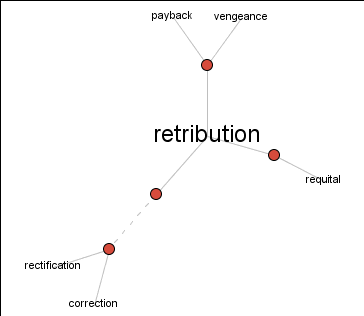Submitted by Norm Roulet on Sun, 09/05/2010 - 20:03.

ret·ri·bu·tion
–noun
1. requital according to merits or deserts, esp. for evil.
2. something given or inflicted in such requital.
3. Theology . the distribution of rewards and punishments in a future life.
Origin:
1350–1400; ME retribucioun < MF < LL retribūtiōn- (s. of retribūtiō ) punishment, reward as result of judgment, equiv. to L retribūt ( us ) (ptp. of retribuere to restore, give back; see re-, tribute) + -iōn- -ion
—Synonyms
1, 2. retaliation, repayment, recompense. See revenge.
—Antonyms
1, 2. pardon.
retribution (ˌrɛtrɪˈbjuːʃən)
— n
1. the act of punishing or taking vengeance for wrongdoing, sin, or injury
2. punishment or vengeance
[C14: via Old French from Church Latin retribūtiō , from Latin retribuere to repay, from re- + tribuere to pay; see tribute ]
retributive
— adj
re'tributory
— adj
re'tributively
— adv
Collins English Dictionary - Complete & Unabridged 10th Edition
2009 © William Collins Sons & Co. Ltd. 1979, 1986 © HarperCollins
Publishers 1998, 2000, 2003, 2005, 2006, 2007, 2009
retribution
1382, "repayment," from L. retributionem (nom. retributio ) "recompense, repayment," from retributus, pp. of retribuere "hand back, repay," from re- "back" + tribuere "to assign, allot" (see tribute). Sense of "evil given for evil done" is from day of retribution (1526) in Christian theology, the time of divine reward or punishment.
Online Etymology Dictionary, © 2010 Douglas Harper
Main Entry: ret·ri·bu·tion
Pronunciation: "re-tr&-'byü-sh&n
Function: noun
: punishment imposed (as on a convicted criminal) for purposes of repayment or revenge for the wrong committed
Merriam-Webster's Dictionary of Law, © 1996 Merriam-Webster, Inc.
retribution, good word
col·lu·sion
noun \kə-ˈlü-zhən\
Definition of COLLUSION
Examples of COLLUSION
Origin of COLLUSION
Related to COLLUSION
___________________________________________________________________
antitrust
adj.
Opposing or intended to regulate business monopolies, such as trusts or cartels, especially in the interest of promoting competition: antitrust legislation.
Federal statutes that regulate trade in order to maintain competition and prevent monopolies. Many common business practices are governed by these statutes. The Sherman Anti-Trust Act of 1890 made price-fixing (the setting of prices in cooperation with competitors) illegal. The Clayton Anti-Trust Act of 1914 outlawed price discrimination (charging different prices to different buyers), as did the Robinson-Patman Act of 1936. Under these Acts, advertising and promotional Allowances are permitted only if they are offered to all dealers on equal terms.
Collusion - I've nailed some very big companines for that
Collusion - I've nailed some very big companies for that in the past, and they paid the price in retribution.
I look forward to nailing lots of colluding enterprises, government officials and individuals, while seeking retribution for their collusion against me, my family and the community to further corrupt interests of MCCO!
Disrupt IT
retribution for conspiracy
con·spir·a·cy
play_w2("C0586500") (kAiding and Abetting/Accessory
A criminal charge of aiding and abetting or accessory can usually be brought against anyone who helps in the commission of a crime, though legal distinctions vary by state. A person charged with aiding and abetting or accessory is usually not present when the crime itself is committed, but he or she has knowledge of the crime before or after the fact, and may assist in its commission through advice, actions, or financial support. Depending on the degree of involvement, the offender's participation in the crime may rise to the level of conspiracy.
I'm thinking about going to law school to address this
I'm thinking about going to law school to address this - I could do it in my sleep and I think I could spend the rest of my life pursuing environmental justice here... and no lawyers here are doing that, that is for sure.
Disrupt IT